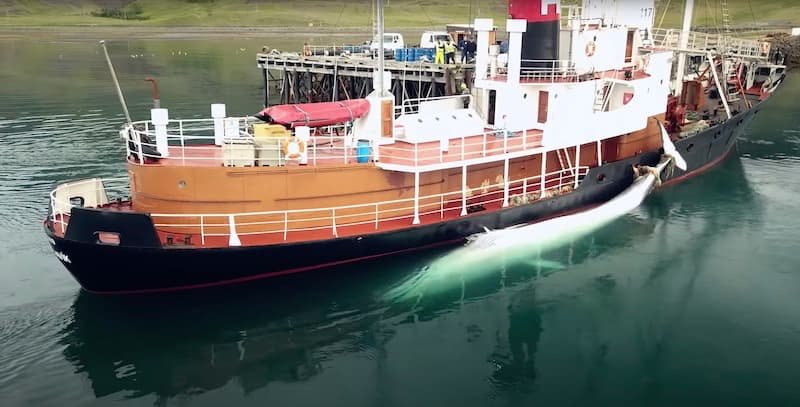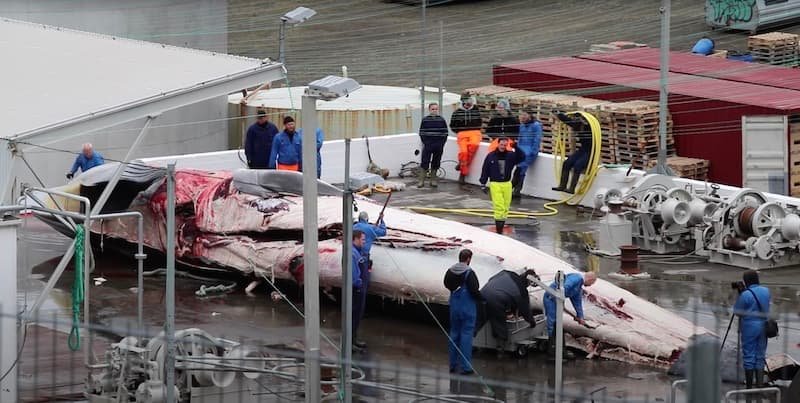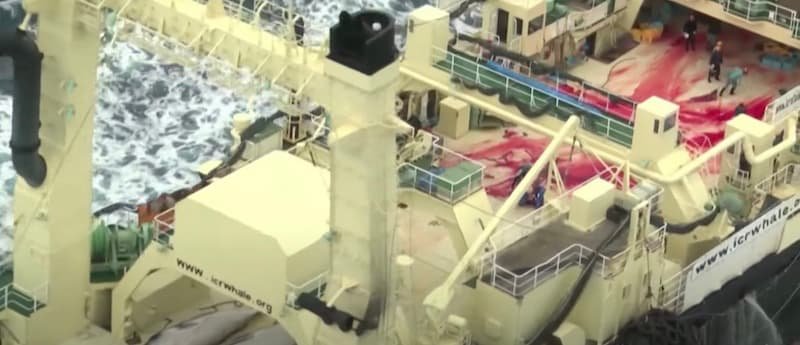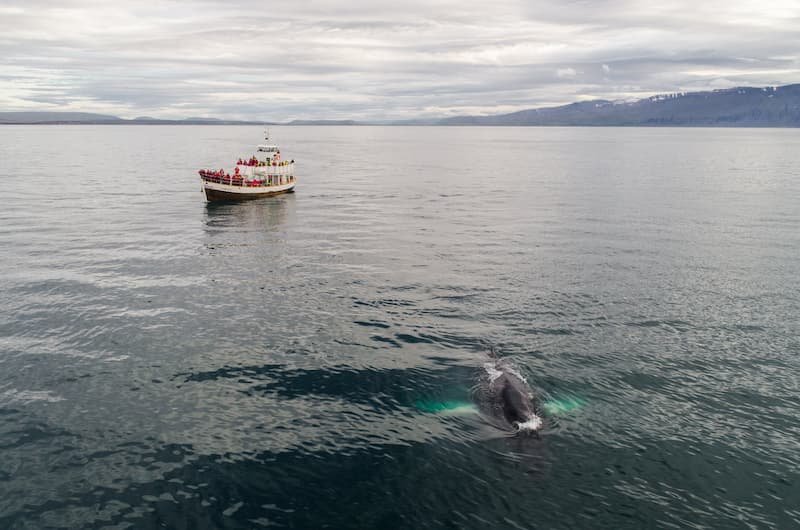
 Olivia Møller
Freediver - Activist - Explorer
Olivia Møller
Freediver - Activist - Explorer

 Olivia Møller
Freediver - Activist - Explorer
Olivia Møller
Freediver - Activist - Explorer
Whaling has been a contentious issue worldwide, with Iceland standing out as one of the few countries still engaged in this practice. Let's look into the controversial topic of whaling in Iceland, exploring the reasons behind its persistence and advocating for its immediate cessation.
Whaling has deep roots in Icelandic history, tracing back to the island nation's settlement more than a millennium ago. The practice has been intertwined with the culture and survival of the Icelandic people, initially serving as a means of sustenance in the harsh Arctic environment. The historical context of whaling in Iceland offers valuable insights into the evolution of this traditional industry and its modern-day implications.
The early settlers of Iceland, who arrived in the 9th century, relied on the rich marine resources surrounding the island. Whales became a crucial source of food, providing meat, blubber, and bones that played a vital role in sustaining communities. Traditional whaling methods involved hand-harpooning from small boats, emphasizing the intimate connection between the Icelandic people and the ocean.
As global demand for whale products increased, Iceland's whaling industry expanded during the 17th to 19th centuries. Whaling stations dotted the coastlines, processing the valuable commodities derived from whales, including oil for lamps and industrial lubrication. The economic significance of whaling during this period contributed to Iceland's livelihood and prosperity, creating a lasting impression on the national psyche.
The 20th century witnessed a significant shift in whaling practices with the advent of industrialization. The introduction of steam-powered vessels and explosive harpoons drastically increased the efficiency of whaling operations. Iceland, along with other whaling nations, embraced these technological advancements to meet the growing demand for whale products on the global market.
The devastation of World War II and the subsequent decline in demand for whale products led to a temporary downturn in Iceland's whaling industry. However, the latter half of the 20th century saw a resurgence in commercial whaling as new markets emerged. In 1948, Iceland resumed whaling activities, marking the beginning of a contentious relationship with the international community.
The global outcry against the depletion of whale populations prompted the International Whaling Commission (IWC) to impose a moratorium on commercial whaling in 1986. While many nations adhered to the ban, Iceland chose to withdraw from the IWC in 1992, resuming commercial whaling in defiance of international consensus. This decision further heightened tensions and brought Iceland to the forefront of the whaling debate.
In the modern era, Iceland justifies its continued whaling activities by citing cultural tradition and economic interests. The nation's government asserts that sustainable whaling practices can coexist with conservation efforts, sparking debates over the necessity and morality of hunting whales in today's context.

Whaling has left an indelible mark on global whale populations, with Iceland actively contributing to the decline of several species through its continued whaling practices. Scientific research has consistently demonstrated the alarming consequences of commercial whaling on the delicate balance of marine ecosystems, emphasizing the urgent need for Iceland to reconsider its stance and cease whaling activities.
Iceland primarily targets two species in its commercial whaling operations: the minke whale and the endangered fin whale. Over the years, the relentless pursuit of these majestic creatures has led to a substantial reduction in their populations. Scientific studies provide concrete evidence of the declining numbers of both minke and fin whales in Icelandic waters.
Whales play a crucial role in maintaining the health and balance of marine ecosystems. Their presence influences the distribution and abundance of various marine species, contributing to the regulation of prey populations and nutrient cycling. The depletion of whale populations due to whaling disrupts these delicate ecosystem dynamics, potentially leading to cascading effects throughout the marine food web.
Whales are known for their slow reproductive rates, with many species producing few offspring over long gestation periods. This biological characteristic makes them particularly vulnerable to overexploitation. Commercial whaling targets reproductive individuals, further exacerbating the population decline. The vulnerability of these species underscores the need for stringent conservation measures to ensure their survival.

Whaling practices, especially when targeting specific age classes or genders, can have profound effects on the genetic diversity of whale populations. Reduced genetic diversity diminishes the adaptive capacity of a population, making it more susceptible to environmental changes, diseases, and other stressors. The long-term consequences of such genetic bottlenecks may threaten the overall resilience of whale populations.
Whale migration patterns often span vast distances, connecting ecosystems across the globe. The impact of whaling in Icelandic waters extends beyond national borders, influencing the broader health of the North Atlantic and Arctic marine ecosystems. Disruptions in one region can have cascading effects on interconnected ecosystems, highlighting the global significance of preserving whale populations.
Climate change compounds the challenges faced by whale populations, making their conservation even more critical. The warming of oceans, melting ice caps, and changes in prey distribution directly affect whales. Whaling exacerbates these challenges, creating a dual threat to their survival. Research indicates that the cumulative effects of climate change and whaling pose unprecedented risks to the resilience of whale populations.
Scientific research plays a pivotal role in understanding the impact of whaling on whale populations and formulating effective conservation strategies. Studies on population dynamics, migration patterns, and genetic diversity provide essential insights that inform international efforts to protect and preserve these magnificent marine mammals.

The debate surrounding the economic viability of whaling in Iceland versus the imperative of conservation underscores a complex interplay between tradition, economics, and ecological responsibility. Proponents of Icelandic whaling argue that it represents a longstanding cultural practice and a source of economic sustenance for the nation. However, a closer examination of economic trends and the potential for sustainable alternatives reveals that the balance may be tipping in favor of conservation.
Traditionally, whaling was not only a means of survival but a cornerstone of Icelandic identity. Proponents argue that the continuation of whaling honors this cultural heritage, presenting a challenge to those advocating for a shift towards conservation.
As Iceland modernized and integrated into the global economy, the reliance on whale products diminished. Changing dietary preferences, along with the availability of alternative food sources, has reduced the necessity of whaling for sustenance. Moreover, the global perception of whaling has shifted, with many countries and consumers expressing disapproval of the practice, affecting market demand for whale products.
Contrary to the economic viability of whaling, whale-watching tourism has emerged as a lucrative alternative. Iceland's stunning coastal landscapes provide ideal habitats for various whale species, drawing tourists eager for ethically responsible wildlife encounters. Research consistently shows that the revenue generated by whale-watching tours surpasses the economic gains from commercial whaling, offering a compelling argument for economic diversification.

Whale-watching tourism not only proves financially lucrative but also creates job opportunities for local communities. Employment in the tourism sector, including guides, boat operators, and hospitality services, far exceeds the limited job market associated with the declining whaling industry. Sustainable alternatives thus contribute to broader economic development and resilience in the face of changing market dynamics.
Critics argue that the Icelandic government's financial support for the whaling industry artificially sustains an economically unviable practice. By redirecting subsidies towards the development of sustainable tourism initiatives and educational programs, Iceland could not only bolster its economy but also foster a greater understanding of marine conservation among its citizens.
Participating in commercial whaling has ramifications beyond domestic borders. The international community has consistently expressed concerns about Iceland's whaling practises. This defiance can negatively impact Iceland's international trade relationships, tourism appeal, and overall reputation as a responsible steward of marine resources.
The crux of the matter lies in assessing the long-term economic and ecological sustainability of whaling versus conservation measures. Sustainable alternatives not only provide economic benefits but also align with global efforts to preserve biodiversity and marine ecosystems. As the world faces escalating environmental challenges, nations like Iceland are urged to adopt practices that ensure prosperity without compromising the health of the planet.
In the upcoming segment of this article, we will scrutinize Iceland's position amidst international criticism and whaling moratoriums. Our exploration will unfold the intricacies of Iceland's withdrawal from the International Whaling Commission (IWC) in 1992, and its subsequent defiance of imposed moratoriums, resulting in diplomatic strains and trade ramifications. The European Union's disapproval has manifested in tying Iceland's accession negotiations to a commitment to cease whaling. Environmental organizations, along with a global community increasingly expressing concern, have embarked on campaigns against Iceland's resumption of commercial whaling. As we navigate through Iceland's complex global standing, the following sections will unravel the ethical dimensions and animal welfare concerns, along with a close examination of the pivotal role technology plays in monitoring and enforcing anti-whaling measures.